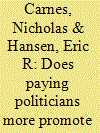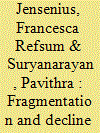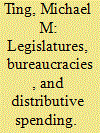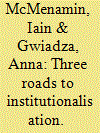| Srl | Item |
| 1 |
ID:
149674


|
|
|
|
|
| Summary/Abstract |
If politicians in the United States were paid better, would more middle- and working-class people become politicians? Reformers often argue that the low salaries paid in state and local governments make holding office economically infeasible for lower-income citizens and contribute to the enduring numerical under-representation of the working class in our political institutions. Of course, raising politicians’ salaries could also make political office more attractive to affluent professionals, increasing competition for office and ultimately discouraging lower-income citizens from running and winning. In this article, we test these hypotheses using data on the salaries and economic backgrounds of state legislators. Contrary to the notion that paying politicians more promotes economic diversity, we find that the descriptive representation of the working class is the same or worse in states that pay legislators higher salaries. These findings have important implications for research on descriptive representation, political compensation, and political inequality.
|
|
|
|
|
|
|
|
|
|
|
|
|
|
|
|
| 2 |
ID:
142597


|
|
|
|
|
| Summary/Abstract |
Tracing activity in 15 Indian state assemblies from 1967 to 2007, we find that overall legislative activity declined but there was also considerable variation across states. States with large electoral constituencies and politically fragmented assemblies showed the worst performance, which suggests a link between political fragmentation and institutional performance.
|
|
|
|
|
|
|
|
|
|
|
|
|
|
|
|
| 3 |
ID:
113557


|
|
|
|
|
| Publication |
2012.
|
| Summary/Abstract |
This article develops a theory of bureaucratic influence on distributive politics. Although there exists a rich literature on the effects of institutions such as presidents, electoral systems, and bicameralism on government spending, the role of professional bureaucrats has yet to receive formal scrutiny. In the model, legislators bargain over the allocation of distributive benefits across districts. The legislature may either "politicize" a program by bargaining directly over pork and bypassing bureaucratic scrutiny, or "professionalize" it by letting a bureaucrat approve or reject project funding in each district according to an underlying quality standard. The model predicts that the legislature will professionalize when the expected program quality is high. However, politicization becomes more likely as the number of high-quality projects increases and under divided government. Further, more competent bureaucrats can encourage politicization if the expected program quality is low. Finally, politicized programs are larger than professionalized programs.
|
|
|
|
|
|
|
|
|
|
|
|
|
|
|
|
| 4 |
ID:
106945


|
|
|
|
|
| Publication |
2011.
|
| Summary/Abstract |
Party institutionalisation is a central problem in political science. The literature tends to understand it as a syndrome and therefore has difficulty explaining variations. This article suggests a new approach based on the transaction between a legislative party and its deputies, the failure of which is observable in party switching. Three routes to institutionalisation are identified by appealing to the vote-seeking, office-seeking or policy-seeking motivations of deputies. Poland has had a large volume of party switching, along with wide variation in the incentives facing differently-motivated deputies. Survival analyses of switching in four Polish parliaments find that vote-seeking is the most likely route to institutionalisation for Polish parties. Moreover, in this article a concrete hypothesis is established for comparative testing: legislative parties can survive as long as their popular support exceeds 40 per cent of their share in the previous election.
|
|
|
|
|
|
|
|
|
|
|
|
|
|
|
|